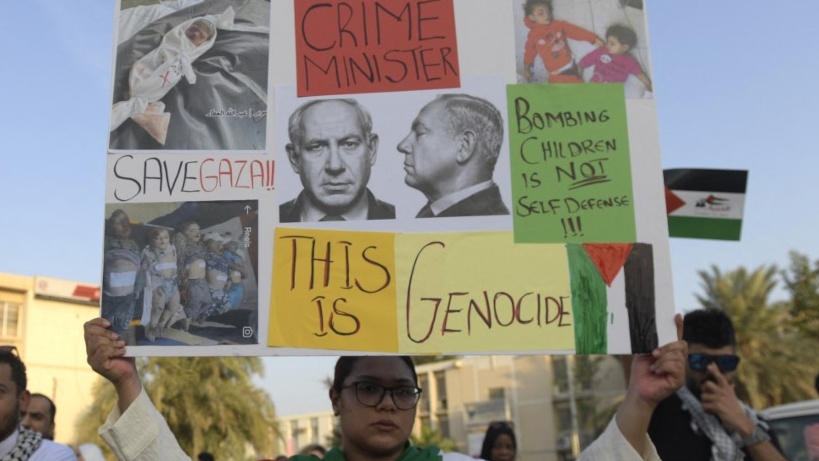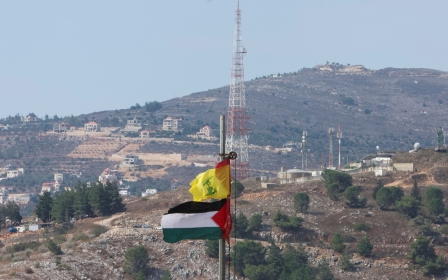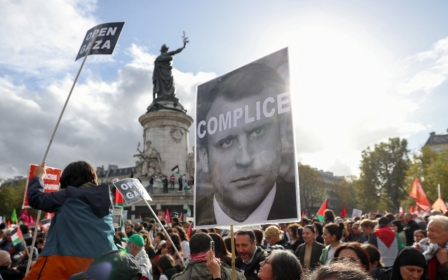Israel-Palestine war: Arab regimes have betrayed Gaza. It's time to change course

Words are not enough. UN resolutions are not enough. Official condemnations are not enough. A small trickle of aid is not enough. These are all empty words and meaningless actions.
As the Palestinian people face a genocide, with Israel indiscriminately killing them, displacing them and destroying their towns and cities, Arab states must act in a meaningful way. It is time for the Arab world, including the Palestinian Authority, to unequivocally sever diplomatic and economic ties with the Israeli state.
All states, by their very design, respond only to self-interest, not moral pleas. Though I will always remain committed to making a case based on justice, I want to focus here on why it is in the self-interest of Arab states to cut ties with Israel immediately.
For two main reasons, Arab regimes currently view their self-interest as being tied to the status quo, wherein Israel proceeds with its settler-colonial project and Arab states ignore the Palestinian cause.
First and foremost, they fear Israeli military power, including the fact that it is a nuclear power. Arab states do not believe that a confrontation with Israel is in their best interests, since Israel and its western allies could destroy Arab militaries.
New MEE newsletter: Jerusalem Dispatch
Sign up to get the latest insights and analysis on Israel-Palestine, alongside Turkey Unpacked and other MEE newsletters
Secondly, these regimes do not want to confront western powers. They all understand that Israel is an imperial outpost of the West, and since they have calculated that they cannot oppose American power, they have decided to work within these confines, which brings economic benefits as well.
In truth, the economic benefits accrued from this approach are largely concentrated in the hands of a minority of political and economic elites. Some might trickle into the middle classes, but, on the whole, the majority of the region's peoples do not benefit from this arrangement, and rightly see their ruling elites as corrupt. This is what the 2011 Arab uprisings were all about.
Revolutionary spirit
Though Arab regimes managed to defeat the uprisings and maintain their power through state violence - including imprisonment, torture, killing, censorship and total surveillance - the revolutionary spirit has not been defeated. It will inevitably rise again and demand the fall of these regimes.
While political and economic elites may view this as a manageable problem that they can deal with through "security measures", just as they did in the 2010s, I would caution against confusing short-term results with long-term stability - and more importantly, confusing wealth with dignity, true freedom and sovereignty.
Follow Middle East Eye's live coverage for the latest on the Israel-Palestine war
People across the region overwhelmingly support Palestine for various reasons, including that they see the Palestinian struggle as a reflection of their own plight and desire for dignity and freedom. They are heartened at seeing the Palestinian people, with few resources and no formal state, standing up to all the military might of the US and Israel.
Such thoughts quickly turn back on the regimes that claim to represent them. They begin to ask why the Egyptian and Jordanian regimes have failed to act to relieve the suffering of Palestinians in Gaza, or why Saudi Arabia has not used the leverage of its oil supply to pressure the US into halting its support for Israel's war.
The swiftest way for these regimes to develop an organic connection with their people would be to take concrete actions that stand up to Israel and the US
While these regimes might be able to prevent their people from collectively expressing such questions as grassroots demands on the regime, the questions remain in the people's hearts and minds, and they are being discussed in communities across the Arab world.
So what is the self-interest for these regimes in changing course now? In short, the answer is legitimacy.
Totalitarian regimes do not enjoy an organic connection with the people they rule, but rather one based on fear. Though the legitimacy of a ruling regime can be sustained through force for long periods of time, it is a highly inefficient and unstable form of legitimacy.
The swiftest way for these regimes to develop an organic connection with their people would be to take concrete actions that stand up to Israel and the US. Indeed, the Palestinian struggle can offer these states an organic legitimacy with the masses. Only then can they become truly liberated and sovereign.
Taking up the torch
There is a special place in history waiting to be filled; for true leaders to emerge and take up the torch of Palestinian liberation.
The current approach of Arab states will make them mere footnotes in history; an afterthought, because their words and actions are merely an expression of their inability to oppose the imperial demands of the US empire. To enter the main text, they must radically transform their thinking and take a bolder stand against Israel and US imperial power.
This does not necessarily mean a war with the US or Israel. Economic and political pressure can work very effectively, perhaps more now than ever.
Arab states have significant economic leverage, and while this road would be long and difficult, they would not be embarking on it alone. Already, Bahrain and Bolivia have cut official ties with Israel, while Chile and Colombia have withdrawn their ambassadors. Many other countries would support this approach of ramping up political and economic pressure on the US and Israel.
A global coalition of nations can become a powerful force if they collectively, openly and directly confront US imperial power, with a goal to oust it from the region. In the same way, Israel can be pushed to give up its settler-colonial project.
If such action is taken, Arab states can move from being a line in the footnotes of history to writing an entirely new book. The conditions are already in place, with people around the world - especially in the Global South, but also in North America and Europe - becoming increasingly fed up with Euro-American imperialism.
Are leaders in the Arab world ready to step up and fulfill the promise of true decolonisation? The people are ready. They just need their elected leaders, ones who will not stand in their way, but rather help the liberation struggle of the Palestinian people. The moment is now, and it can start with all Arab states severing ties with Israel.
The views expressed in this article belong to the author and do not necessarily reflect the editorial policy of Middle East Eye.
This article is available in French on Middle East Eye French edition.
Middle East Eye delivers independent and unrivalled coverage and analysis of the Middle East, North Africa and beyond. To learn more about republishing this content and the associated fees, please fill out this form. More about MEE can be found here.






